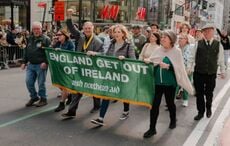DANIEL CASSIDY
1943-2008
Writer, musician, college professor and Irish America Top 100 honoree Daniel Cassidy died on October 11 at his home in San Francisco. The author of the book "How the Irish Invented Slang: The Secret Language of the Crossroads" succumbed to pancreatic cancer at the age of 65.
Born in Brooklyn, New York, Dan Cassidy boasted Irish heritage on both his parents' sides.
Emigrating to Brooklyn at the end of the 19th century, Cassidy's father came from a family of native Irish-speakers. Irish roots on Dan's mother's side can be traced to famine Irish immigrants who landed in New York in the 1840s and 50s.
"How the Irish Invented Slang," tracing the Irish influence on American slang in the 1800s, was the masterpiece of a language devotee whose writing also appeared in the New York Times, The Chronicle, the New York Observer and Atlantic Monthly. However, Dan's legacy extends well beyond his writings into music and film.
For several decades Cassidy was a professional musician with gigs at Carnegie Hall, the Tonight Show and the Los Angeles Civic Auditorium.
Nominated in 1996 for an Emmy award, Cassidy's film "Civil Right and Civil Wrongs" documented the troubled political situation in Northern Ireland.
Dan Cassidy founded and co-directed the Irish Studies program at New College of California as well as directing the Media and Films Studies program, teaching courses in storytelling, the American newspaper and broadcast history.
News of his death was met with great sadness by the Irish-American community. Author Peter Quinn told the San Francisco Chronicle, "It was a privilege to know him; a great grace to have his friendship. His legacy to the Irish-American community is inestimable. We are so much poorer for his passing."
Daniel Cassidy is survived by his wife, Clare McIntyre.
JUNE LEVINE
1931-2008
Author and feminist June Levine died on October 14 in Dublin after suffering a stroke.
A central figure in the women's movement in Ireland, she wrote two books, "Sisters," which detailed her role in the movement in Ireland during the 60s and 70s, and "Lyn," a book about the life of prostitute Lyn Madden.
Levine was on the famous Contraceptive Train that traveled from Dublin to Belfast in 1971 to import contraceptives back to the Republic, where they were banned at the time. Nell McCafferty, who also made the train trip, told the Irish Independent that June was the "most improbable social outlaw - a galleon in high heels, fashion labels and lipstick."
Actress Fionnula Flanagan, a friend of Levine's, told Irish America: "June Levine was was a magnificent friend, not just to me but to the many artists, writers, poets, painters, playwrights whom she welcomed into her home.
"She was a driving force in the Women's Movement in Ireland in the sixties and seventies and I was delighted to hear the news - as was she on the last evening before she died - that Cork University Press are republishing her book "Sisters," which chronicles much of that turbulent and exciting time. She will be sorely missed by all her friends, by her loving and courageous husband, Professor Ivor Browne and by her children, Dianne, Mark and Adam and their families."
WILLIAM MURPHY
1916-2008
W.B. Yeats family biographer William Murphy died on September 26 in Schenectady, NY.
A professor at Union College in Schenectady for almost 40 years, Murphy is most well known for his biographies of Yeats family members that led scholars to reconsider the importance of the poet's relationship with his father and sisters.
Born in Astoria, Queens and raised in Flushing, Murphy was educated at Harvard University where he earned his bachelor's, master's and doctorate degrees.
After teaching there for three years he joined the Navy and helped to write a manual on the use of rockets in aircraft anti-submarine warfare. In 1946 he joined the English Department at Union College.
Aside from Yeats, Murphy's other academic interests were religious freedom and church-state separation and the question of authorship of Shakespeare's plays. William was an adamant defender of Shakespeare against scholars who proposed alternative authors of the plays.
William Murphy's work with Yeats began with an idea for a small article about Yeats's trip to America. Murphy's trip to Dublin ended up resulting in a friendship with Yeats's son and widow and a much larger project than Murphy originally anticipated.
"She brought out biscuit tins filled with letters from John Butler Yeats to all his children," Mrs. Murphy told the New York Times. "At that point it became obvious that a small article was not going to do the job."
Murphy's books "Prodigal Father: The Life of John Butler Yeats" (1978) and "Family Secrets: William Butler Yeats and His Relatives" (1995) relied heavily on letters and diaries that Murphy painfully transcribed.
The hard work paid off and Murphy's biography was highly lauded by his fellow academics including prominent Yeats biographer Richard Ellmann who called "Prodigal Father" an "outstanding picture of the life of Ireland's greatest families."
Murphy's personal relationship with the Yeats family while writing the book eventually resulted in his being granted ownership of the gravesite of John Butler Yeats.
Murphy's wife of 69 years, Harriet, confirmed his death at the age of 92. He is survived by their three children, Christopher Ten Broeck Murphy, Deborah Chase Murphy Thompson and Susan Doane Murphy Thompson; six grandchildren and three great-grandchildren.




Comments